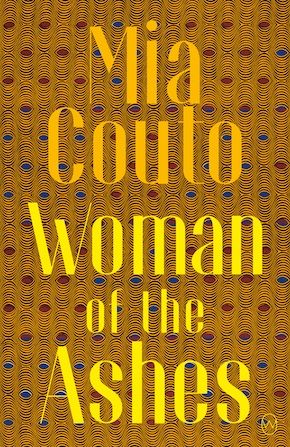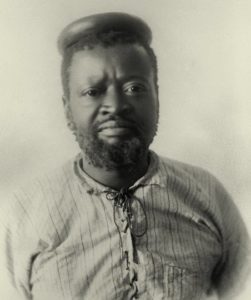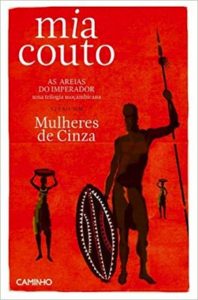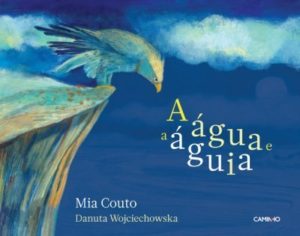Mia Couto: Singular dualities
by Mark Reynolds
“A profound meditation on war, the fragility of empire, and the ways in which language shapes us.” The New York Times
Mia Couto’s Woman of the Ashes is the first novel in a trilogy centred around the 1895 overthrow of southern Mozambique’s last emperor, Ngungunyane. As warring factions threaten to divide the country an unforeseen love affair unfolds between 15-year-old village girl Imani and exiled Portuguese sergeant Germano de Melo. Imani is torn between pragmatic service to Portugal and loyalty to the coastal VaChopi people whose lands have been invaded by Ngungunyane’s southern empire; while Germano lacks any practical support for the planned Portuguese attack on the south, and succumbs to encroaching fever and madness as the war plays out beyond his grasp. Amplifying the divisive nature of these events, Imani’s two brothers take opposing sides in the conflict: listless Mwanatu tries to make himself useful as a guard and messenger for Germano’s garrison, while headstrong Dubula has disappeared into the interior and pledged allegiance to Ngungunyane.
MR: How widely is Ngungunyane’s story known in Mozambique, and what drew you to writing about this period?
MC: Ngungunyane is a very well known character in Mozambique, an historical figure. Everybody knows him, even the younger generation. Immediately after independence, Samora Machel, the first president, tried to rehabilitate him as a national hero. Countries need these ‘fathers of the nation’, but that was a bad decision because he only represented the part of the country that was his empire, and as it was an empire it was constructed by violence – occupying lands and killing a lot of people, mainly in two ethnic groups, the VaChopi and the Ndau. The first statue of him that went up was immediately vandalised, so it was a step backwards, and the story to promote him as a nationalist figure was full of lies. Ngungunyane was the grandson of the first emperor of the Nguni, who are originally from the north of South Africa, and when the empire of the Shaka Zulu was divided, the Nguni invaded Mozambique and occupied half the country. So on the Mozambican side we tried in a very ideological, a very political way to erase the bad part of the story. For the Portuguese he was promoted differently, as a key enemy, because they needed a big victory. They defeated his empire easily because it was already falling apart and there was no resistance – so not such a glorious historical and military moment. I think between those two lies, those opposing narratives, was very rich ground for collecting truths that could be shaped into a literary text.
Where Imani’s first-person narration is soaked in myth and folklore, Germano’s language, delivered solely via letters to his superiors, is stiff and formal, then grows increasingly frenzied as he succumbs to his feverish visions. It’s a very striking and engaging structure that invites fast reading. How did the two voices first emerge for you?
On the Portuguese side there’s a lot of documentation, the most interesting of which comes in the form of a collection of letters that were exchanged between the military commanders, and the language they used is very interesting. I was moved by the quality of the letters, and thought this was maybe one way of presenting the voice of Germano. He is a representative of Portugal, but he is also a republican who was deported to Mozambique alone, expecting an army to follow him that never came. Imani also belongs to a divided world. She’s a translator of not just languages, but of different perceptions of time. She was educated by the priests so she can understand very well and very deeply the world of the Portuguese, but she’s also steeped in traditional knowledge. She’s a projection of the author in some respects.
Today people ask me, ‘When did you decide to join the struggle?’ But it was not a decision, it was a kind of destiny.”
The next two books in the trilogy – The Sword and the Spear and The Drinker of Horizons – have already been published in Portuguese. When might we be able to read on in English?
David Brookshaw has finished translating the second book, and told me it will come out in the US in the middle of next year.

Ngungunyane wearing his wax crown, photographed by the Portuguese soon after his capture in December 1895
The Sword and the Spear picks up directly where Woman of the Ashes leaves off, and plots Imani and Germano’s love affair against the demise of the kingdom of Gaza, while in The Drinker of Horizons Imani is still only 15 when she leaves Africa as an interpreter with Ngungunyane’s entourage for Lisbon and beyond, but then the book embraces a much wider timespan to take in his death in exile in 1906 and her eventual return to her home village in 1911 after the fall of the Portuguese monarchy.
In my head the first book was land, the second book was the rivers and the last book was the sea. So in Woman of the Ashes I’m describing the environment where the conflict happens, then in the second book the Portuguese travel along the rivers to arrive at Lourenço Marques [present-day Maputo], and in the third one Ngungunyane is sent by sea to Portugal, and then deported to the Azores. Imani is a survivor, even after Ngungunyane dies in the Azores, and she has something to tell and she’s finishing the story.
So at what point do you abandon the dual narrative of the first book? Is the second book still from two points of view, or does the structure start to break up?
It’s still there. Plus there are letters from different people. Something happens to the hands of the sergeant that means he’s not able to write, but he continues to dictate the letters.
You were born in Portuguese Mozambique and grew up during a ten-year War of Independence followed closely by 16 years of Civil War, during which you worked as a journalist. How did you reflect on being perceived perhaps as a son of the colonisers during those upheavals?
I feel at ease with that because first of all I’m not just the son of someone, I’m my own construction, and my father and my mother were not typical colonisers. My father was deported from Portugal for political reasons, he was a journalist and a poet and he could not go back from the very first years of this exile. So when he came to Mozambique with my mother and raised a family, they encouraged their three children – I’m the middle one – to stand up for the country, saying, “This is your land. You must join the fight for freedom.” For us it was not an option. Today people ask me, “When did you decide to join the struggle?” But it was not a decision, it was a kind of destiny. So I don’t see myself as the son of colonisers in this sense. Of course part of me is European, from Portugal, but I don’t see this as a conflict. I see it as a privilege to have both cultures. At the same time, in Beira and the big cities in Mozambique, there’s a group still known as assimilados, which is perhaps an unfortunate name for the black people who were educated as Portuguese to produce a kind of elite to manage state affairs. The white guys still in Mozambique are really a tiny fraction, perhaps ten thousand in a country of 27 million.
 I was talking earlier this year to Leïla Slimani, who as a French-Moroccan writer is a strong advocate of Francophone cultural connections. Your books are successful in Brazil and Portugal, for example. Do you feel the same way she does about forging connections with different countries that share a language?
I was talking earlier this year to Leïla Slimani, who as a French-Moroccan writer is a strong advocate of Francophone cultural connections. Your books are successful in Brazil and Portugal, for example. Do you feel the same way she does about forging connections with different countries that share a language?
Yes, why not? But I don’t think I’ll become militant about it. I don’t see a banding together among the Francophone, Lusophone or English-speaking countries in Africa. In, let’s say, my linguistic community, I don’t know what’s happening in Angola, I don’t know what’s happening in Cape Verde or São Tomé or Guinea, so the five African countries that speak Portuguese as the official language don’t know each other. But none of those countries are worried about this. We are in a certain geopolitical position in southern Africa, Angola is living with other things… so maybe Portugal wants to raise the Lusophone banner, but I don’t think it’s a concern for the African countries.
What have been the landmark events of the last twenty-five years of democracy and economic growth in Mozambique, particularly in the light of a single dominant party, FRELIMO [the Mozambique Liberation Front], holding onto power?
I think one direction that FRELIMO chose from the beginning was to reach what you can call modernity, to be a modern country, and there were a lot of mistakes around this idea. The biggest was to impose more aggression and violence – including against the African languages of Mozambique, which in the beginning were forbidden, no one could speak any other language than Portuguese in public. It was also forbidden to speak about races and tribes and ethnic groups: “We are all Mozambicans, there should be no discussion about race or ethnic identity.” But now I think we’ve turned this upside down, and we are discussing those issues, which is a very important victory. And yet the political and economic model is the same that has been proved everywhere not to work. Infrastructures are now much better than I find when I travel around other countries in Africa. Everywhere in Mozambique you will find places with electricity and good clean water distribution. Of course the Civil War took us back; everything we were capable of doing immediately after independence was destroyed during that war. You can imagine sixteen years of destruction of roads, factories, schools, hospitals, it was really, really hard. When the war was over, Mozambique was one of the poorest countries in the world, and we had to rebuild everything, which didn’t always go smoothly. We could not produce any kind of middle class, we just have a small, small elite that is so dependent on the predatory way of linking politics with the economy, which we know is a recipe for failure.
One thousand years ago China sent big boats to explore Africa, and they went back and said there’s nothing interesting there, forget it. Now it’s different.”
Which other countries have a strong influence on Mozambique today?
We are the single Lusophone country in Africa that has an important economy next to the border, and South Africa has had a lot of influence. In a good and bad way, we have a model there. Maybe more than one million, two million people went to South Africa or Zimbabwe and came back as migrant workers and they took that model. They had contact with a big city, big companies, with skilled work, and that helped us very much. China is the only country that is thinking three decades in advance, that has a long-term vision of its relationship with Africa, which is not really helping the construction of democratic societies. But we know with some countries there are political criteria that sometimes mean they ignore a dictatorship in Africa and enter a close relationship with them. Europe and the United States were condemning them because of the lack of democracy, but then oil is discovered, and they forget all the political conditions. So I don’t know who is the good guy and the bad guy in this picture. Just to say, in the last two or three years something new is happening, China is trying to establish cultural relations with Mozambique. They are building a big joint cultural centre in the capital, they started to publish Mozambican authors in China – and Angolan authors too – so I think something is happening beyond just economic factors and natural resources being sent to China. They want to know us a little bit better. One thousand years ago they sent big boats to explore Africa, and they went back and said there’s nothing interesting there, forget it. Now it’s different.
You’re a biologist and ecologist whose research has focused on the collection of myths, legends and beliefs that have an effect on the management of coastal resources. Can you say something about how the two intersect?
In the southern part of Mozambique, if you ask about legends and myths created around the ocean, there is nothing. Even the name of the ocean there is ‘the big place’ and a boat is ‘the train of the sea’, and they don’t say ‘to fish’, they call it hunting, so there’s a transference of their inland culture which has only recently been pushed into contact with the sea. Women are not allowed to fish, the same as in inland culture where women cannot hunt. And the cycle and traditions are like slash-and-burn agriculture that respects the ability of the earth to rehabilitate and to rest for a while. So in some areas we are using what we know from the interior to ask people to manage natural resources in coastal areas.
And how has this informed your teaching?
I’m not teaching any more, but it was really one of the happiest times in my life. I was responsible for creating a new subject for architects, to explain the dynamics of the natural landscape. I did a lot of research on how nature is the first big architect, designing and shaping and searching for colours, how structure translates function, how nature resolves problems of space. It became a passion. I said to my students, “I want you to feel something, that when you look at a tree you feel some connection and you feel that the tree can talk to you and say, ‘Look, I found some solutions, let’s talk about my story.’” Because the shape of the tree is an architectural design for solving problems of light or wind. The guys really captured my passion, but the first moment I was in touch with the students I asked them to draw a tree, and almost every one of them drew a conical shape, and there are no trees that shape in Mozambique. So I asked them, “Where did you see these trees? We cannot see this here.” So their ideas of the natural environment or how a building should be are taken from outside. It’s like being colonised in very subtle ways. When they dream about a tree they don’t dream about the trees that are around them.
I confess you’re the only Mozambican writer I have so far read. Who are some of the others we should know about?
Those who are also widely translated are Paulina Chiziane, Ungulani Ba Ka Khosa and João Paulo Coelho. In Mozambique they are the best known for a large body of work. A lot of excellent young writers are now also appearing, but writing poetry which is not yet translated.
 Aside from the novels, you’ve also written a number of books for children, many of them beautifully illustrated by Danuta Wojciechowska. Is there any prospect of seeing those translated into other languages?
Aside from the novels, you’ve also written a number of books for children, many of them beautifully illustrated by Danuta Wojciechowska. Is there any prospect of seeing those translated into other languages?
I would like that very much. The first country that will translate those books is China, they have bought the rights for two of them. I don’t know why that hasn’t happened more widely, because as you say Danuta has done a tremendous job.
Can you say something about the work of the Fernando Leite Couto Foundation, which is named in honour of your father?
We knew that my father in the last ten years of his life was working with young people to help them to write, and to publish. But when he died we received so many letters from people that we didn’t know, from all over Mozambique, and we were surprised at just how much work he had done for others. And then the three of us, the three brothers, decided let’s continue this as a way to keep him alive. We decided that the main purpose of the foundation was literature, but let’s also do the same for other areas – music, theatre, painting, graphic arts and photography. We give opportunities for people to have workshops and to be trained in those areas without paying anything. We have a gallery where young artists can exhibit their work, and in between we have exhibitions of established artists to help raise money. We also publish my books there, and with the money we get from that the next month we’ll publish someone new. So far we have published 14 books by younger writers, and we are also distributing books that people donate to schools around Mozambique. In my home town Beira, we’re working with two cultural associations and a school where we are giving books and support for the reconstruction of the library. All the established artists who make an exhibition or publish a book commit to coming to tell stories about themselves and the work. So it’s about the fabric of stories, and a way people can find ways of saying, “OK, I can also be a writer, or a painter.”
Finally, what have you been writing since the trilogy?
I’m writing something about my childhood in Beira, and I’m in the middle of a new novel. I was about to visit Beira when the cyclone hit in March so I couldn’t go, and I think I must go back to Beira to feel that the story is still alive. It was a story of a person trying to find memories even though he knows those memories are false. But for now I don’t know what will happen. The city will tell me how to manage it.
 Mia Couto, born in Beira in 1955, is one of the most prominent writers in Portuguese-speaking Africa. After studying medicine and biology in Maputo, he worked as a journalist and headed several Mozambican national newspapers and magazines. He has been awarded the Camões Prize for Literature and the Neustadt International Prize for Literature, among other awards. He was a finalist for the Man Booker International Prize in 2015 with A River Called Time, and was shortlisted for the 2017 International DUBLIN Literary Award for Confession of the Lioness. He has written over 20 books, and his work has been translated into 24 languages. He lives in Maputo, where he works as a biologist. Woman of the Ashes is published in paperback by World Editions.
Mia Couto, born in Beira in 1955, is one of the most prominent writers in Portuguese-speaking Africa. After studying medicine and biology in Maputo, he worked as a journalist and headed several Mozambican national newspapers and magazines. He has been awarded the Camões Prize for Literature and the Neustadt International Prize for Literature, among other awards. He was a finalist for the Man Booker International Prize in 2015 with A River Called Time, and was shortlisted for the 2017 International DUBLIN Literary Award for Confession of the Lioness. He has written over 20 books, and his work has been translated into 24 languages. He lives in Maputo, where he works as a biologist. Woman of the Ashes is published in paperback by World Editions.
Read more
@miacoutooficial
@WorldEdBooks
Author portrait © Pedro Soares
David Brookshaw is a professor emeritus at the University of Bristol. He has published widely in the field of Brazilian and Lusophone postcolonial studies, and has also translated the work of various authors from Portuguese, including Mia Couto’s Confession of the Lioness.
Mark Reynolds is a freelance editor and writer, and a founding editor of Bookanista.
@bookanista
wearebookanista

